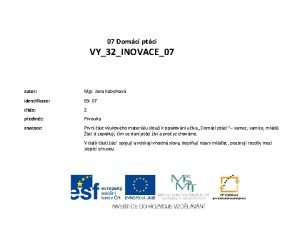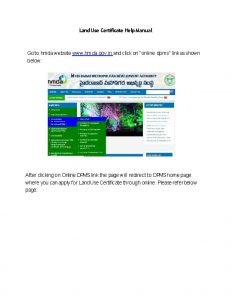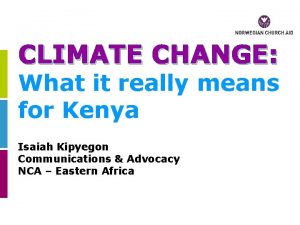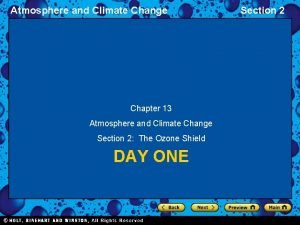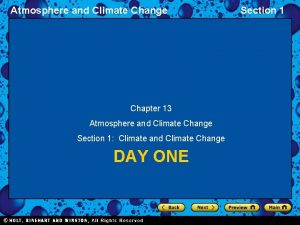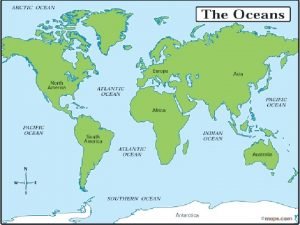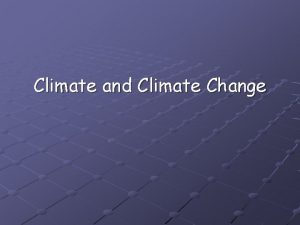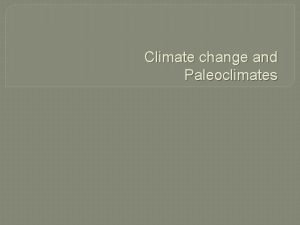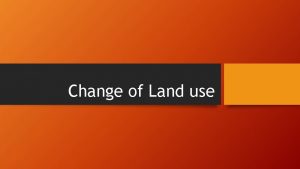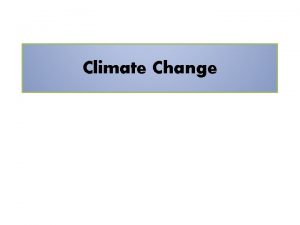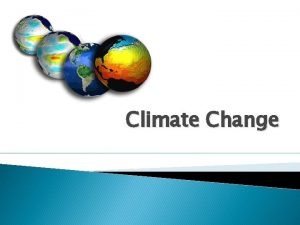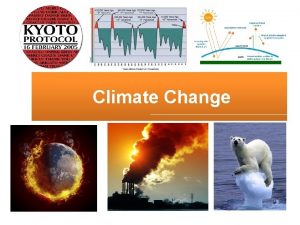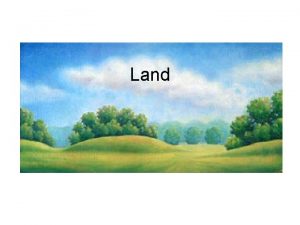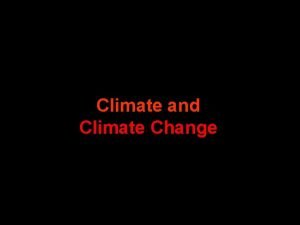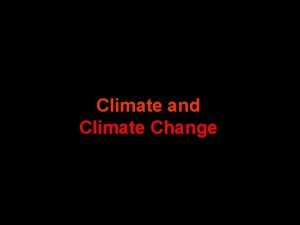Land Use and Climate Change Stephanie J Houser













- Slides: 13

Land Use and Climate Change Stephanie J Houser Earth Climate Systems www. dcnr. state. pa. us www. injuryupdate. com. au www. gnb. ca

Outline n n n Why be concerned with land cover/land use change How do different land cover/land use changes affect climate Climate model studies DOE-PCM A 2 & B 1 IPCC SRES (Feddema et al. , 2005) n CLM 3 coupled model (Gibbard et al. , 2005) n n Summary of findings

Why? n n Changes in land cover/use are major but poorly recognized drivers of longterm global climate patterns May be as important as changes in climate and weather associated with greenhouse gases Changes often permanent IPCC has yet to include effect in assessments Pielke 2005

How do land cover/land use changes affect climate? n n Impacts on global climate divided into two major categories Biogeochemical and Biogeophysical Biogeochemical n n Chemical composition of the atmosphere Biogeophysical n Directly affect physical parameters that determine absorption/distribution of energy at the earth’s sfc n Albedo

How do these changes affect climate? n Deforestation n Warming due to decreased evapotranspiration Modification of surface fluxes of heat and water vapor Reforestation n lowering of sfc albedo leads to a net warming Increase sfc fluxes of water vapor Cooling with vegetation at lower latitudes due to evapotranspiration www. greenpeace. org www. auroville. org

Climate model studies n n Fully coupled Department of Energy Parallel Climate Model (DOE-PCM) Combined land-cover and atmospheric forcings for A 2 and B 1 IPCC SRES scenarios Land cover change – Integrated Model to Assess the Global Environment (IMAGE) IPCC SRES land -cover projections and DOE-PCM natural vegetation data For each SRES scenario, ran model from n n n 2000 to 2033 with present day land cover 2033 to 2066 with 2050 land cover 2066 to 2100 with 2100 land cover (Feddema et al, 2005)

Feddema et al, 2005

• Temperature change • All forcing scenario minus atmospheric forcing with constant land cover fd • Most significant regional climate effects are associated with changes in mid-latitude and tropical regions Feddema et al, 2005 • Tropical regions with same land cover forcings have different responses • Amazon – warming due to change from broadleaf forest to agriculture • Net radiation changes in atm forcing scenarios offset by increases in latent heat fluxes when forests are present • Land-cover and atm forcing simulations, reduced latent heat flux, increased incident radiation Indonesia - lack of response attributed to Asian Monsoon circulation which override feebacks from local land-cover change

Diurnal Temperature Range Feddema et al, 2005 • More significant impact • Decreases significantly in southern Asia • (A 2) Midlatitide regions experience decrease in DTR • In the Amazon, significant increase in daily minimum temperatures (nighttime)

Climate model studies n n Not reproducing observed patterns of land cover change, nor realistically simulating possible future scenarios CAM 3 (Community Atmosphere Model) Coupled with the CLM land model and slab ocean and thermo sea ice model Control runs with both current vegetation and bare soil n Two vegetated experiments, one with trees, and one with grass/shrubs. (Gibbard et al. , 2005)

a. Temperature difference between the tree simulation and bare soil simulation - Heating effects of forest in upper latitudes - Albedo-change dominates over evapotranspiration b. Vegetation from 20 -50 N replaced by forest, rest of vegetation current - Direct effect of trees is warming (more than with bare ground) c. Albedo change (bare vs. tree) - Snow-albedo feedback effect responsible for 25% of change in sfc albedo between bare and tree simulations - Max albedo change in North where snowfall has decreased due to increased temperatures

Summary n n Changes in Land cover and Land use induce changes in climate on regional and global scales Albedo-change and evapotranspiration effects dominate cooling/warming of climate Overall warming due to reforestation (higher latitudes) Forestation causes cooling in Amazon, whereas deforestation seems to cause warming n n n Evapotranspiration effects dominate at lower lats Future research is needed to determine exact nature of responses due to land use and land cover change (Feddema et al. , 2005) In order for IPCC to more accurately predict future climates the effects of Land cover change and land use change must be included in future assessments

Questions?
 Climate change 2014 mitigation of climate change
Climate change 2014 mitigation of climate change Old man's cloth
Old man's cloth čím se živí husa
čím se živí husa Allan houser reverie
Allan houser reverie Samantha houser
Samantha houser Samantha houser
Samantha houser Land use certificate telangana
Land use certificate telangana Land and climate
Land and climate Climate change meaning and definition
Climate change meaning and definition Atmosphere
Atmosphere Chapter 13 atmosphere and climate change
Chapter 13 atmosphere and climate change An area of land largely enclosed by higher land
An area of land largely enclosed by higher land High rocky land usually with steep sides
High rocky land usually with steep sides Climate change paragraph
Climate change paragraph


